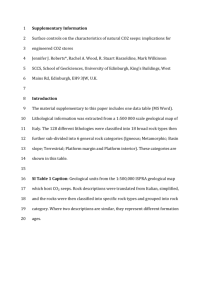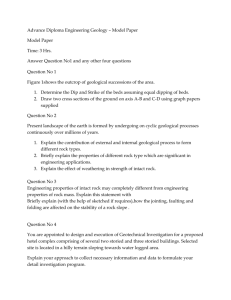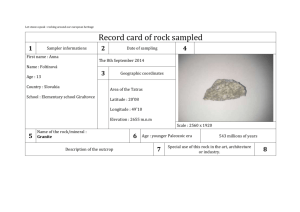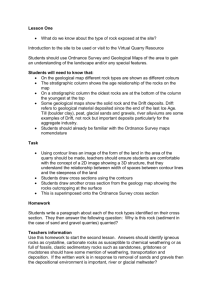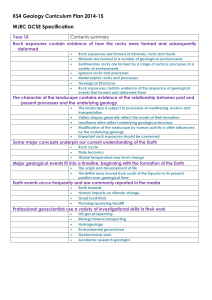SARMa_SDB_template
advertisement
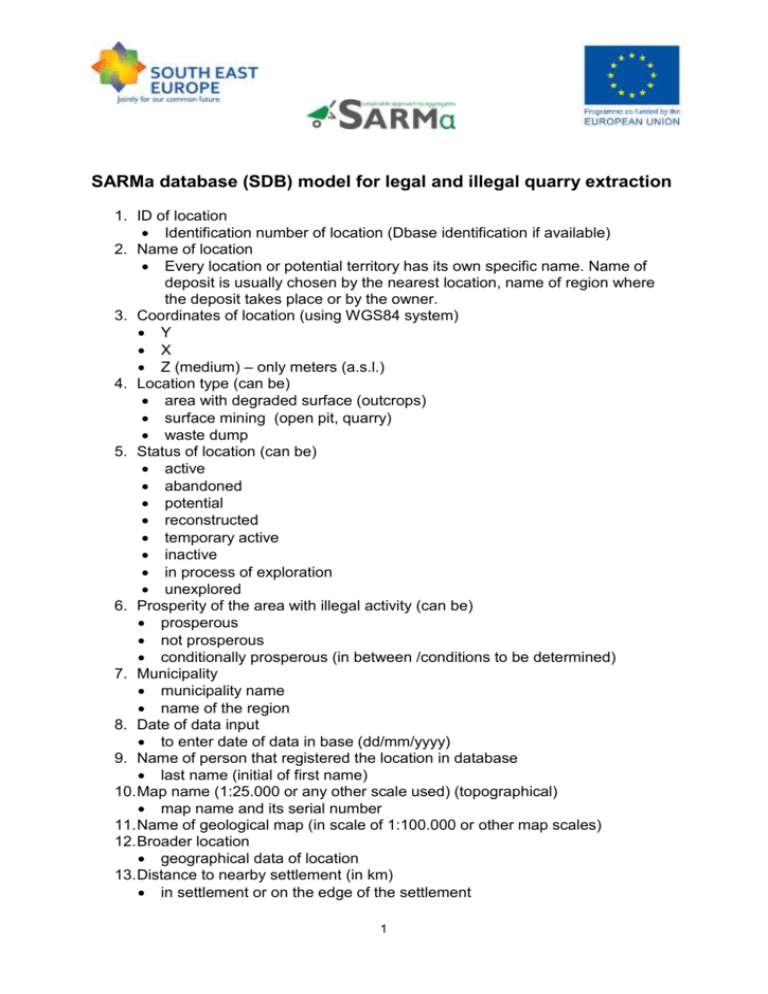
SARMa database (SDB) model for legal and illegal quarry extraction 1. ID of location Identification number of location (Dbase identification if available) 2. Name of location Every location or potential territory has its own specific name. Name of deposit is usually chosen by the nearest location, name of region where the deposit takes place or by the owner. 3. Coordinates of location (using WGS84 system) Y X Z (medium) – only meters (a.s.l.) 4. Location type (can be) area with degraded surface (outcrops) surface mining (open pit, quarry) waste dump 5. Status of location (can be) active abandoned potential reconstructed temporary active inactive in process of exploration unexplored 6. Prosperity of the area with illegal activity (can be) prosperous not prosperous conditionally prosperous (in between /conditions to be determined) 7. Municipality municipality name name of the region 8. Date of data input to enter date of data in base (dd/mm/yyyy) 9. Name of person that registered the location in database last name (initial of first name) 10. Map name (1:25.000 or any other scale used) (topographical) map name and its serial number 11. Name of geological map (in scale of 1:100.000 or other map scales) 12. Broader location geographical data of location 13. Distance to nearby settlement (in km) in settlement or on the edge of the settlement 1 14. Distance and direction to distal settlements should be given 15. Location (can be) forest meadow pasture degraded land, but covered by plants / overgrown nature conservation area national heritage site (archeological, technical, historical...) river other 16. Location visibility (can be) determined by visibility from settlement or local road(s) poorly visible (could be quantified in percentage) visible in local area (<5km) visible in broad area (>5km) 17. Description of location (text) short description of location position and description of the of the wider surroundings deposits 18. Infrastructure near by high voltage lines low voltage lines electric wire telephone wire waterworks water tower water/gas pipes roads railways airports sewers other 19. Waters nearby proximity and location of permanent or temporary water protected areas 20. Geological age of rock age of the rocks taken from recent geological maps age of rocks determined by undertaken analysis (if different) 21. Thickness of humus cover estimated thickness of humus in surface mining (quarrying) to be given in meters 22. Thickness of weathered rock estimated thickness of weathered rock in surface mining (quarrying) to be given in meters 2 23. Rock type name of the rock (the geological one or any other commonly used) 24. Name of the rock by Mining Act (if different than geological name – such crushed rock / aggregates for limestone, dolomite or other rocks) 25. Rock description field description color texture structure brittle deformation rock homogeneity 26. Rock analysis (made) Complexometry Y/N Hydro geological report of location or area Y/N Petrography Y/N Sample stored Y/N 27. Volume of extracted rock (m3) (total and annual figures) 28. Description of use of extracted material construction chemical industry cement industry Manufactory other 29. Resource estimation (m3) 30. Area of resource estimation (ha) Estimation of the area with resource 31. Description of resources Description of specific characteristic of rocks and location 32. Potential use Description of potential use of rock made in field Potential use of rock is selected from the attached set of base 33. Remediation of location Location need to be remediate Location is naturally remediate Remediate already 34. Remarks Important remarks of location that were not described in other parts 35. References Indication of the relevant literature signature 36. Author indication of author of fieldwork and author of research 37. Date of field check / exam date of fieldwork 3
